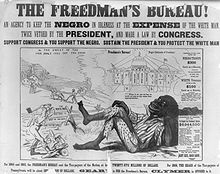"Now there is no question that this crisis has a third, nearly unprecedented dimension: the personality of Donald Trump, who is manifestly unfit for office. The only parallel from history is Andrew Johnson, the President from 1865 until 1869, who immediately fell into a conflict with the Republican leadership in Congress, did what he could to stop Reconstruction from changing the South, and was nearly removed from office." DK
This seems a manifest Whig interpretation of Johnson, also of Lincoln, and by implication, of Reconstruction itself.
It doesn't matter so much, yet, whether it might later turn out to also be a Whig interpretation of Trump, but I am guessing that it already has that tendency!
It doesn't matter so much, yet, whether it might later turn out to also be a Whig interpretation of Trump, but I am guessing that it already has that tendency!
Reading J G Randall, The Civil War and Reconstruction, a well respected professor of history at the University of Chicago at early to mid 20th Century, one is told that Johnson followed both the letter and the spirit of Lincoln's own plan which had already been sketched out, transmitted to the Southern States, and acted upon by a number of states, for reconstruction, rather than that of the Radical Republicans in Congress.
Johnson of course payed dearly for this, as Lincoln would have, as well, had he lived.
Read Randall's account. Don't take my word for it.
Monday, June 19, 2017
This was a Northern political poster, 1866, from Pennsylvania, against the Radical Republicans in Congress.
Wonder why?
MORAL JUDGMENTS IN HISTORY BUTTERFIELD
"I cannot be sure of my facts here, but I suspect that Mitch Landrieu was the first white southern politician since the time of the Civil War itself to state publicly that the Confederacy was on the wrong side of history and humanity, as he put it, and that it rightfully lost the war." DK on Mayor Landrieu's Confederate Monuments speech.
One senses that these are perhaps sentiments and assessments which DK shares with the Mayor...
"It is the natural result of the whig historian's habits of mind and his attitude to history -- though it is not a necessary consequence of his actual method -- that he should be interested in the promulgation of moral judgments and should count this as an important part of his office. His preoccupation is not difficult to understand when it is remembered that he regards himself as something more than the enquirer. By the very finality and absoluteness with which he has endowed the present he has heightened his own position. For him the voice of posterity is the voice of God and the historian is the voice of posterity. And it is typical of him that he tends to regard himself as the judge when by his methods and his equipment he is fitted only to be the detective. His concern with the sphere of morality forms in fact, the extreme point in his desire to make judgments of value, and to count them as the verdict of history. By a curious example of the transference of ideas he, like many other people has come to confuse the importance which courts of legal justice must hold, and the finality they must have for practical reasons in society, with the most useless and unproductive of all forms of reflection-- the dispensing of moral judgments upon people or upon actions in retrospect....." Butterfield, The Whig Interpretation of History, VI. "Moral Judgments in History".
"...(a point historians repeatedly ignore, often operating with an ethics of success which blames losers for their failure)..." Schroeder, The Transformation of European Politics, p 741.
Terms search: Butterfield
"...(a point historians repeatedly ignore, often operating with an ethics of success which blames losers for their failure)..." Schroeder, The Transformation of European Politics, p 741.
Terms search: Butterfield


No comments:
Post a Comment